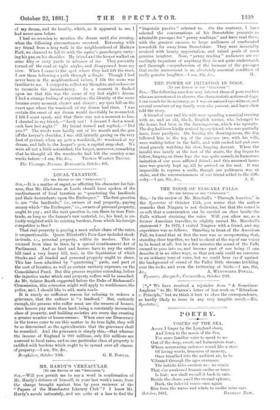LOCAL TAXATION.
[To THE EDITOR OF TEE " SPECTATOR."'
Sra,—It is a matter of regret, as affecting his character for fair- ness, that Mr. Gladstone at Leeds should have spoken of the readjustment of local taxation as " quartering the landlords and their descendants upon the Exchequer." The first question is, are "the landlords," i.e., owners of real property,. paying money which " the Exchequer," i.e., owners of personal property, ought to pay ; and the next question is, can there be true Free- trade, so long as the farmer's raw material, i.e., his land, is un- justly weighted with its existing burdens, from which his foreign competitor is free ?
That real property is paying a most unfair share of the rates, is unquestionable. Queen Elizabeth's Poor-Law included stock- in-trade, i.e., personal property, within its meshes. This is excused from time to time, by a special (continuance) Act of Parliament. And so land and houses have to pay the entire bill (and a very heavy bill, too), in the liquidation of which Stocks and all funded and personal property ought to share. This has been admitted by "quartering " gaols, and part of the cost of lunatics, as well as certain sanitary expenses, on the Consolidated Fund. But this process requires extending, before the injustice under which real property suffers will be remedied. As Mr. Sclater Booth suggested before the Duke of Richmond's Commission, this extension might well apply to workhouses, the police, and, I should like to add, main roads.
It is surely no sufficient reason for refusing to redress a grievance, that the sufferer is " a landlord." Bat, curiously enough, the persons who suffer most are the owners of houses, since houses pay more than land, being a constantly increasing class of property, and building societies are every day creating a greater number of house-owners. When once our Democracy in the towns come to see this matter in its true light, they will be as determined as the agriculturists that the grievance shall be remedied. And the grievance is simply this,—that whereas the income of England is 900 millions, only 250 millions are assessed to local rates, and so one particular class of property is saddled with burdens which ought to be spread over all classes of property.—I am, Sir, &c.,


































 Previous page
Previous page